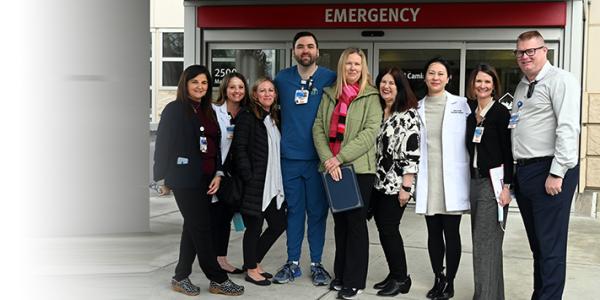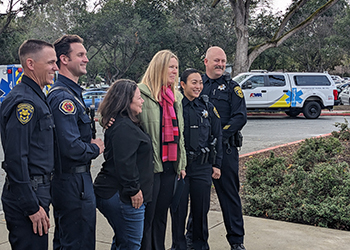


It was another chore-filled Sunday for Kris, a 49-year-old single mom of three teenagers. After ordering her weekly groceries online, Kris joined her two youngest kids to enjoy some pizzas they had ordered and headed to the garage to do laundry. A few minutes in, her son heard a loud thud and called out to his mom to check if she was okay. When there was no answer, Kris' son went to the garage and found her on the ground, unresponsive. He called out to his older sister, who agreed they needed to call for help.
The quick-thinking kids immediately dialed 9-1-1 on their phones, and the dispatcher directed them to do chest compressions on their mom until the paramedics arrived. After a brief minute, the Sunnyvale Department of Public Safety's officers were at the door and delivered the first electric shock to revive Kris' heart, which had stopped beating. The paramedics arrived within the next couple of minutes to deliver two more shocks to her heart.

Kris was immediately put in an ambulance and rushed to the Emergency Room at El Camino Health Mountain View, where she was put into a medically induced coma for the next 72 hours while the staff at the hospital kept a close watch on her heart. She had suffered a cardiac arrest.
A sudden cardiac arrest can cause a person to lose consciousness, become disabled or die if not treated immediately. Out-of-hospital cardiac arrests kill nearly 350,000 people each year in the United States. Only one in ten survive. On that fateful day in November 2023, Kris was one of those fortunate people—everything that could have gone right went right for her.
"I owe that all to everybody," she says, thanking her sharp-witted kids for acting quickly, the officers and paramedics who promptly showed up at her door, and the ER staff at El Camino Health who took her under their care. "Everything changed within the blink of an eye."
Kris' cardiac arrest came out of almost nowhere. She led a reasonably healthy lifestyle: she went to the gym, practiced Pilates and meditation, and walked regularly. There were no obvious risk factors for heart-related ailments and no genetic causes. Her scans and tests after the incident showed nothing abnormal in her heart.
In hindsight, Kris says, there were subtle but easily-missable signs. Early last year, when she broke her ankle, she ended up being diagnosed with May-Thurner Syndrome—a rare vascular disorder in which an artery compresses a vein in your pelvis. She had developed blood clots throughout her leg and was put on blood thinners. Her walking had since become clumsy, but she attributed that to the healing from the broken ankle and subsequent thrombosis. The stress of single-handedly juggling parenting duties with a demanding full-time job was taking its invisible toll. But she went on with her life.
"Your body will keep going as much as it can, regardless of what is going on under the hood, until the organs break down," she says, "And that’s what happened to me."
Since arriving at El Camino Health, Kris has been under the care of cardiologist Dr. Ajanta De, who she says has been instrumental in healing her heart. She went through a procedure where doctors implanted a combined pacemaker (a battery-powered device that helps the heart beat in a rhythm) and cardiac defibrillator (a device that monitors the heart rate and shocks it to restore a normal heartbeat) in her heart.
Without access to Kris' entire medical history, the hospital staff had to piece together a puzzle to understand her condition when she was rushed to the ER—a task Kris says they excelled at. They asked the kids to scrounge the medical cabinet at home to know what medications she was on and sought information from her loved ones about her health—all while she was comatose. She now encourages everyone to keep their medical history accessible to their loved ones so they can share it with doctors in case of an emergency.
"The team at El Camino Health was really kind and thoughtful throughout my stay at the hospital," Kris says, "They encouraged my loved ones to come visit and not to have me by myself." The staff also patiently answered all her questions—despite her foggy brain asking the same question many times. She had a safe space where she could recuperate. And she did.
After the surgery, Kris signed up for the Cardiac Rehabilitation Program at El Camino Health, which combines exercise, education and support to help patients lead a heart-healthy lifestyle. The three-day-a-week program had been instrumental in helping her get back on her feet.
"The rehab program was very educational," says Kris about the three months she spent there. "It provided a sense of community and a safe space for patients like her to open up and talk about their recovery. Through the program, she has learned to follow a nutritious diet and make healthy food choices, understand the stress cycle and close it out, and listen better to her body so she can catch any sign of discomfort.
However, the most important takeaway from the program was regaining her confidence after the sudden traumatic event. Empowered with the knowledge of how her heart now functions, she can recognize patterns of exhaustion or stress that could throw her heartbeat off the charts. She is now back at her Pilates classes and is slowly resuming the active life she left behind six months ago. The rehab program also helped navigate her fatigue, adding one task at a time to her daily life. Since May, she has started going back to work.
"Looking back, I think cardiac arrest is the worst thing that could happen to somebody, but it has also been very transformative for me."